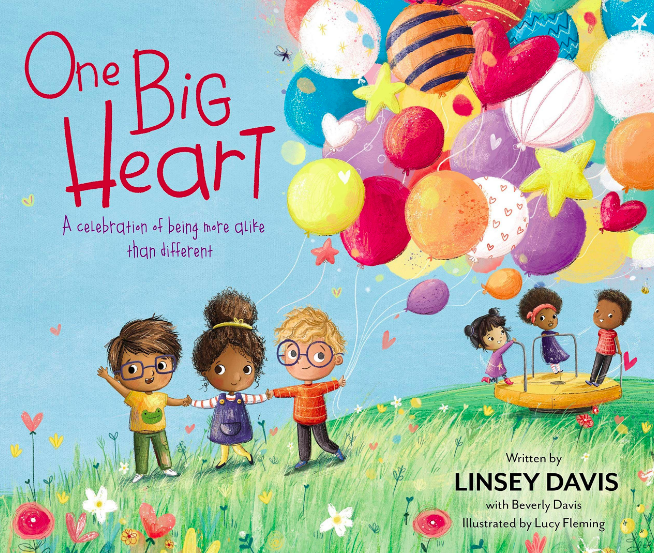Discovering Light When Our Hearts Are Breaking: Linsey Davis & Grace Anna Rodgers
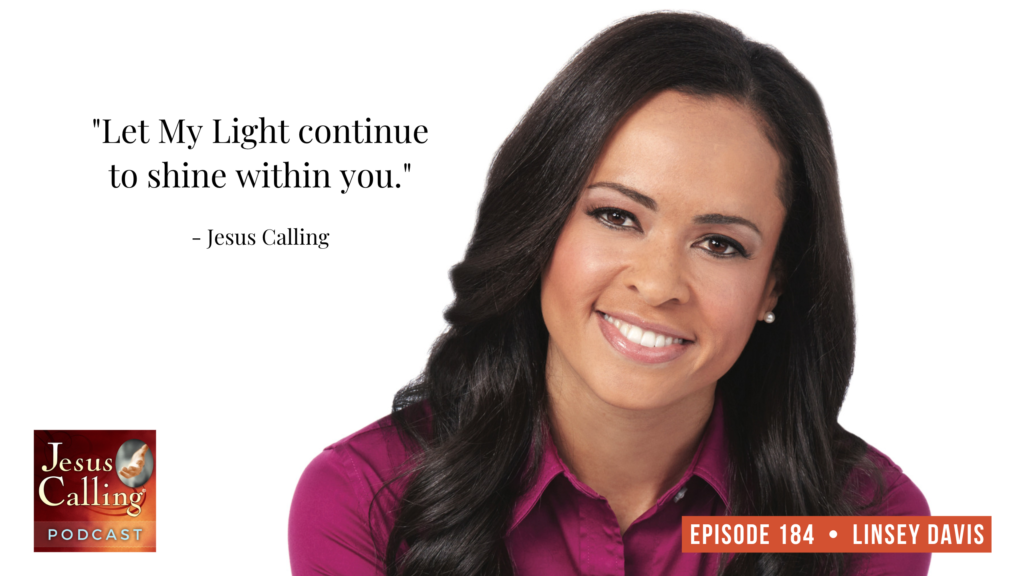
Linsey: I think, when things are going well, you might be like, Oh, thank you, God, I know you’re there. But you’re not down on your knees necessarily pleading and asking, so I think that sometimes it’s those most dire moments that figuratively bring you to your knees and literally bring you to your knees that really strengthen that relationship with God.
Discovering Light When Our Hearts Are Breaking: Linsey Davis & Grace Anna Rodgers – Episode #184
Narrator: Welcome to the Jesus Calling Podcast. Today’s guests share that despite the challenges we face, we can choose to bring joy and light to the dark corners: Emmy Award-winning journalist and author Linsey Davis, and inspirational mother and daughter Angela and Grace Anna Rodgers.
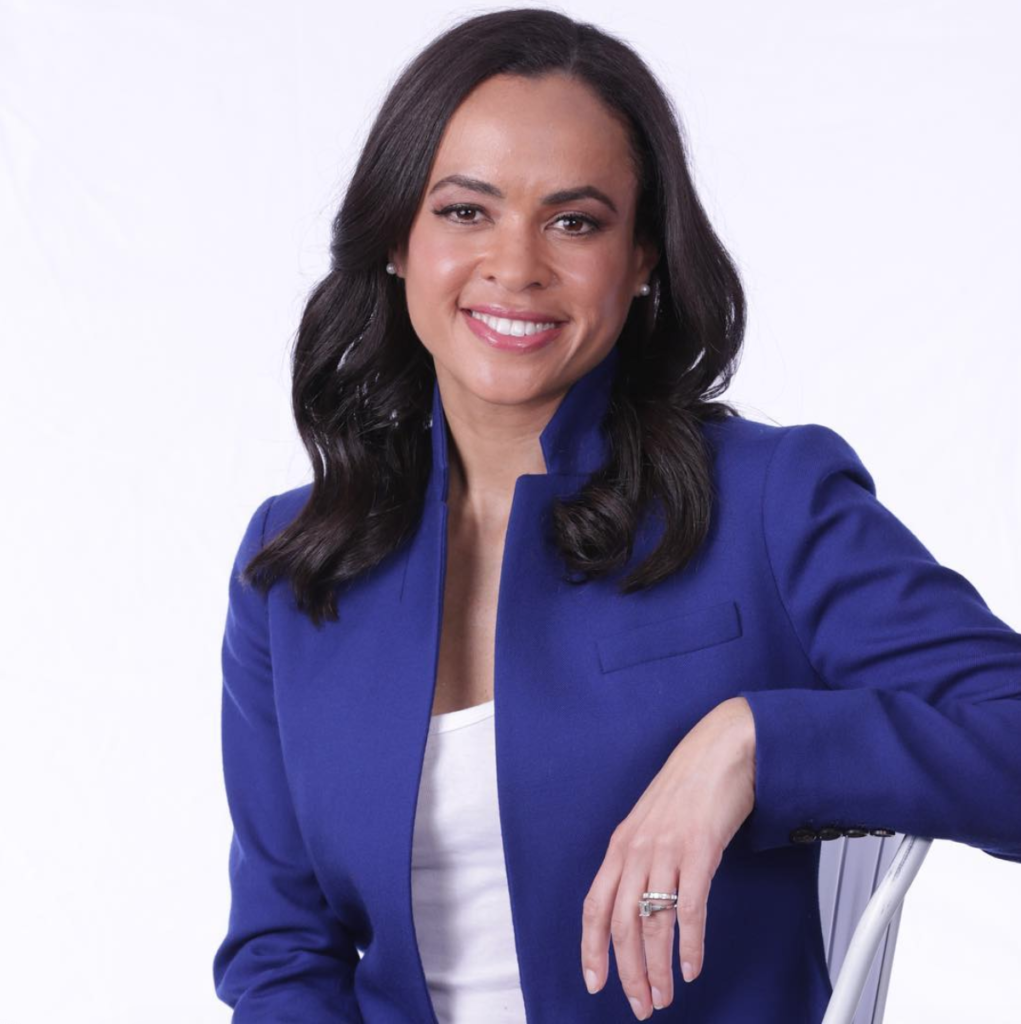
Linsey is a correspondent for ABC News, and has filed stories for World News Tonight, Good Morning America, and Nightline. Falling in love with storytelling at an early age, Linsey tried her hand at public speaking for the first time in church. Her faith in God has been key to her compassionate style of reporting and her desire to spread a message of hope to a world where the news isn’t always good.
Linsey: My name is Lindsey Davis. I’m a correspondent for ABC News, a mom, a wife, and a book author.
Faith and Family Build a Solid Foundation
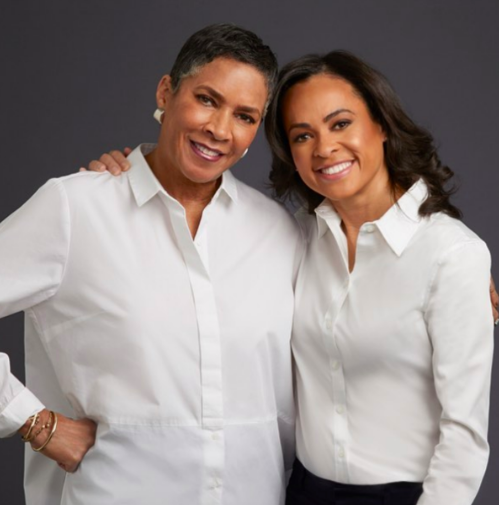
Both of my parents started out, actually, as school teachers. My dad taught math and my mom taught English. My dad went on to open his own construction company, but my mom has subsequently retired as an English teacher. She’s the person that made sure that I knew her common phrases, like, “Turkeys get done and people get finished.” [She’s] the person that was always making sure that I got lay versus lie right. I would say that [my mom was] also very much responsible for my falling in love with storytelling and with writing and with the English language. My mom has always been a big writer, and she spent a lot of time in our house writing and modeling that for me.
And certainly, she loves to tell the story—when she’s introducing me—that I got mad at her. She says when I was a certain age, I said, “Why didn’t you tell me that these letters made words?” I was so anxious to be able to read and write, and that was something that I think that she very much cultivated.
“[My mom was] very much responsible for my falling in love with storytelling and with writing and with the English language.” – Linsey Davis
Growing up, I can remember being a toddler, getting a few quarters and putting them in a little dolly purse that I had, and going off to Sunday school and giving my donation and being very involved in the children’s choir. [Those are] all the same things that I’m trying to impart on my son now, who’s five. They called it the YPD—it was the Young People’s Division at church. On the fourth Sunday, that was Children’s Sunday. We did everything on Sunday except for preach[ing]. We did the affirmation of faith and welcoming visitors and passed the plates for the offering.
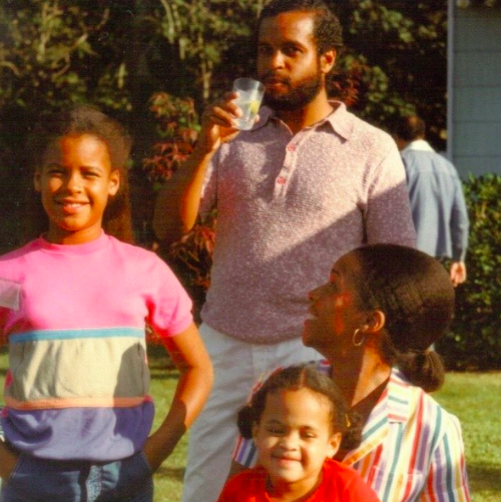
When I look back now, I think [my time in church as a child] was so important to who I am today. My first time ever doing any kind of public speaking was in church. I think that confidence-building is what I’m looking at as far as what I feel is part of the building blocks of success if you will. I found the foundation in the church. And again, now I’m looking at making sure I get that foundation for my son.
“When I look back now, I think [my time in church as a child] was so important to who I am today.” – Linsey Davis
Discovering the Magic of Storytelling
I didn’t know what I wanted to be when I grew up. I ended up majoring in psychology in undergrad, and I really I think that that still is very much the base of what I do now. I have an interest in people and hearing their stories and talking to them about it in a way that’s still kind of relevant to what I do as a journalist.
I studied abroad for a semester in London, and it was the first time—I’d already fulfilled my core curriculum classes—in my college career that I was able to take any class that I wanted to, so I took a lot of writing and British literature. I happened to be in Spain with my Spanish exchange student from high school, and I was watching the news in her house in Spanish, and my Spanish was not very good, so I can’t say that I understood anything that they were saying.
But in that moment, I’d said, “That’s what I want to do.” And I will say—I guess it’s a blessing or a curse—I’m the kind of person who really focuses in on something and really doesn’t let it go. So for whatever reason, I decided in their living room in Seville, Spain that day, that that’s what I want to do. Then I just started looking at like, What do I need? What are the steps that I need to take in order to do that?
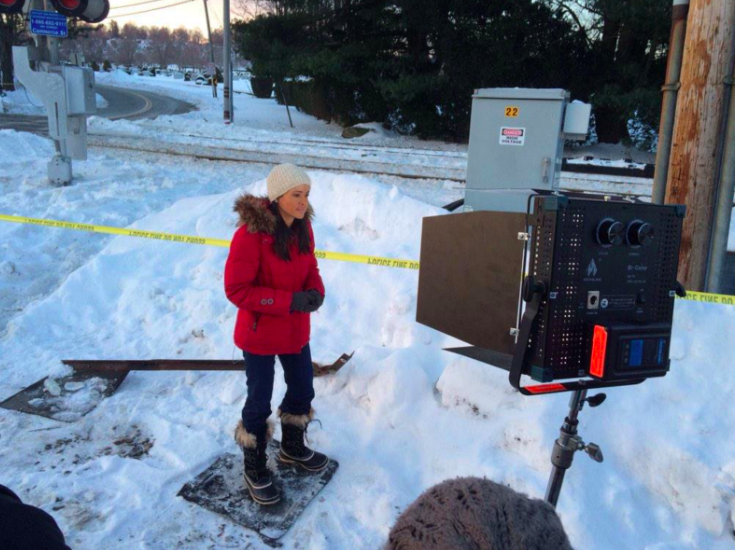
I didn’t know anybody who was in the business. Well, I knew someone indirectly, a family friend who owned some TV stations. And that’s how I ended up getting my first job, I basically was like a glorified intern, and I really didn’t know quite what I was getting myself into. I didn’t know the longevity I might have. At that point, I had a master’s degree in broadcast journalism, mass communication, and I figured I ought to try pursuing a job in what I had majored in. But I really didn’t know what the trajectory would be or where I was going to end up, but it just felt like, This might be a good fit for me, we’ll see.
Grappling with a Hurting World
The hardest story ever to report—and I’ve been a journalist now for more than twenty years— was the earthquake in Haiti. It was the first time that I had actually smelled death. It sounds like a cliché I would read about in a novel, but there is definitely a smell to death, especially when you have corpses that are still exposed in a street, and nobody is tending to those bodies for several days at a time. I remember, in particular, doing one interview with a lady who only spoke French, and we had a translator, but the words actually needed no translation, her feeling and sentiment [conveyed her meaning]. The translation in English—and I don’t even remember my question to her—she said, “I am my family now.”
And that was it. Everybody that she knew had died, all of her friends and all of her family, and she didn’t have a house. She didn’t have anything. Her church had been destroyed. And it was the first time that I actually covered a story. Normally, I cover a lot of disasters, death, and mayhem, and I just go back to my regular life and don’t skip a beat, because I think there is that separation of putting my reporter hat on and then going home and being a mom. Often, it’s an easy transition between the two, and this one was not. I mean, with this one, I got back home and thought about all the things that we take for granted. This woman, and many others like her—hundreds, if not thousands, like her—were now in the same predicament of starting from scratch. And not even starting from scratch in the way of physical buildings and our material comforts, but she didn’t have any family, or any friends, or a job. So that was a really hard story, and I was there for, I think, maybe ten days. So it was a lot.
You know, there are a lot of times that I can’t explain—and our [place], I think, is not to really understand God’s plan, it’s beyond our understanding. So when I’m thinking about, in particular, that woman in Haiti who’s lost it all, and I cannot explain that, right? I can only talk about what God has done in my life, and who He is in my life, and my family. And as I’m teaching my son about who God is, it’s really personal. I mean, I can see God’s hand in other people’s lives, for sure. But when truly catastrophic things happen, I don’t know how to explain it. But I have to believe that God has a plan.
“I can see God’s hand in other people’s lives, for sure. But when truly catastrophic things happen, I don’t know how to explain it. But I have to believe that God has a plan.” – Linsey Davis
Taking in and Giving Out Light
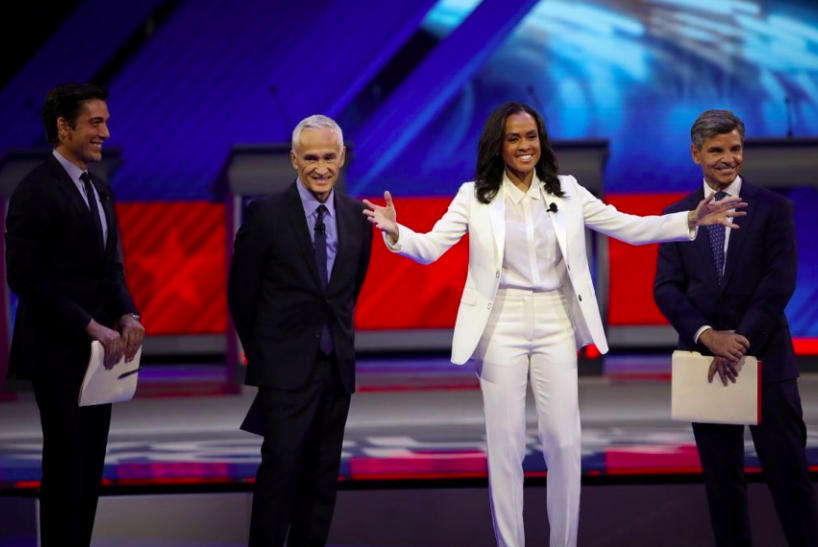
Leading up to moderating the presidential debate, I was feeling nervous, like, Oh, my goodness, I’m gonna be on this world stage and asking questions of politicians, just knowing that there was a lot at stake. [I was] feeling a lot of anxiety about that. I’ve had a Jesus Calling on my nightstand for several years, and I have read it. But I was making sure now, during that time, that I was looking for some Word, I was looking for that confidence, and I was regularly, every day, making sure I did not miss it. I was starting out my day with whatever the devotional was for that day.
And so when I was then going to Houston to do the debate, I had taken pictures of the days that I would be away so that I wouldn’t actually have to bring the book, and now that I’m thinking about it, I should’ve just downloaded the Jesus Calling app, right? What was I thinking? I’m a little old school in that way. But my husband didn’t realize I had taken those pictures, so each day that I was in Houston, he would take a picture and forward it to me. I never told him that I already had the pictures, and I’d already read. There was no way that I was going to go [to the debate] without being prepared and reading from Jesus Calling every day.
“There was no way that I was going to go [to the debate] without being prepared and reading from Jesus Calling every day.” – Linsey Davis
Narrator: Along with enjoying a successful career in journalism, Linsey is committed to spreading a message of love and acceptance, laying a foundation for the upcoming generation. She talks about the two children’s books she has written and how her parents inspired her by the way they lived their own lives.
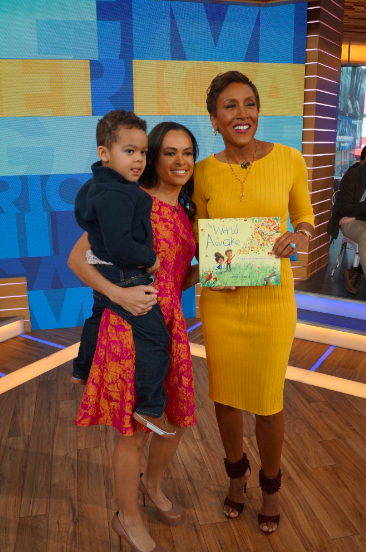
Linsey: For both books, I have to say that these were messages that my mom was trying to impart on me and [my] older sister. The first book [The World is Awake] is a celebration of everyday blessings, so being thankful and honoring God, I mean, that definitely was both of my parents, really paying attention to the small things and God’s hand and fingerprint all over that.
In the second book, I think it was the same thing that I’m trying to do with my son. You know, back when I was growing up in the eighties, I don’t think that the climate was quite the same as what it is now. I mean, it’s not like racism is new by any stretch, but I think the rhetoric has gotten kind of heightened, so it’s different. Maybe racism then was a little more subtle than it can be at times today, so I don’t know that [my mom] had to be as deliberate. I don’t know that it was something that she had to make sure that she was telling us, because, again, I think that she believes, like I do, that innately, children just love. They’re not thinking about all the different divisions that we are quite often as adults.
There’s just been more deliberate discussion about race lately that children listen to and ask about. So I think that I would be doing my son a disservice, I think we would be doing the children of his generation a disservice, by trying to say, “You’re not old enough to talk about this,” or, “We don’t need to talk about this,” or whatever and try and sweep it under the rug. I think that we really need to meet it head on and talk about, “Yes, there are people who think this, but guess what? We love them.”
The first commandment is to love God with all your heart and soul, and the second is likened to it, to love your neighbor as yourself.
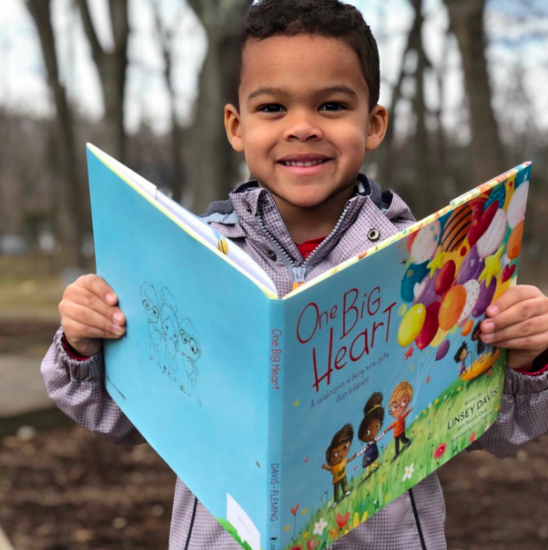
For the second book, One Big Heart, it’s a celebration of being more alike than different. I felt like with the current climate in our country and world, I wanted to reinforce that that’s an important cause. It’s not a new lesson for children, I think that children already get it, they’re not first focusing on our differences. You know, my son’s five, and when he comes home and he’s met a new friend, he doesn’t tell me about their race or their background or religion or culture. He just says what they have in common. They both like LEGOs, or drawing pictures, or whatever it is. So I wanted to reinforce that notion for him and other children and parents who I think to find that same value important to put in place for their children. People often say, “Oh, children don’t see color.” And I totally disagree with that, I think that they do see color, they just don’t assign a value to it. Quite often, it’s adults who do that, and I think that when you look at the hate crimes that are rising the last three years—they’ve ticked up year over year—I think that a lot of that is a fear of the unknown. When people have not been exposed to people who look different, from people who have different beliefs, who act differently, perhaps, there becomes this we versus them, this us versus them attitude. And I think that that becomes so divisive, especially when people are playing and preying upon dividing and making our differences the first thing that we notice.
“My son’s five, and when he comes home and he’s met a new friend, he doesn’t tell me about their race or their background or religion or culture. He just says what they have in common.” – Linsey Davis
What I believe is really imperative for parents is to expose their children to kids who are different. Maybe you live in an area that’s not very diverse, so they’re not seeing that diversity in school or church or synagogue or on the playground. I think then you have to look at what other tools you have: their dolls, their toys, their books. Those are ways that I think it’s very easy for children to be exposed and experienced people who may look different from them. The premise of One Big Heart is, “Let’s deal with it. Let’s talk about it, what people call the elephant in the room.” I believe that children do notice the difference. Let’s say, “Hey, we have different color skin and hair and features and likes and dislikes. But guess what? God gave us all this unique gift. He gave us all one big heart and that’s the most important part because that’s where love starts.”
“Let’s say, ‘Hey, we have different color skin and hair and features and likes and dislikes. But guess what? God gave us all this one unique gift. He gave us all one big heart and that’s the most important part, because that’s where love starts.’” – Linsey Davis
Narrator: You can find Linsey’s book, One Big Heart, at your favorite bookseller today.
Stay tuned to hear Angela and Grace Anna Rodgers’ story after a brief message about a special edition of Jesus Calling just for families.
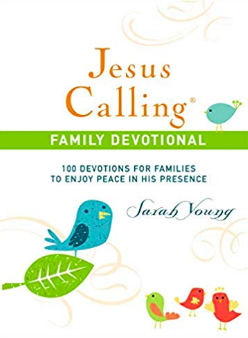
There’s a special version of Jesus Calling available just for adults and children to do their devotions together called the Jesus Calling Family Devotional. Each day offers an adult devotion from Jesus Calling® and a children’s devotional excerpted from Jesus Calling®: 365 Devotions for Kids. With the devotions side by side for children, parents and children can read their own devotion and then read, talk, and pray together. These beloved devotions are based on Scripture and include enriching questions designed to bring your family closer to each other and to God. To learn more about the Jesus Calling Family Devotional, please visit JesusCalling.com today!
Narrator: On the heels of several heartbreaking miscarriages, Angela Rodgers found out she was pregnant again. After a visit to the doctor for testing during her third trimester, she received some sobering news: the baby had numerous issues and would likely be born with severe health problems. At that same time, Angela found out she was having a girl, and the moment she saw her heartbeat, she knew she loved her and would fight for her life. After Grace Anna was born, the baby’s problems were so severe, Angela couldn’t even hold her in her arms. Instead, Angela would sing to the baby, and through the ensuing years, as Grace Anna withstood countless surgeries, she became a bubbly toddler who loved to sing. Her performance of the national anthem at a sporting event when she was only four years old captured the hearts of Facebook fans everywhere—to the tune of over four million views. Now nine years old, Grace Anna is still singing and bringing joy to those who hear her—and she and her mom want to spread the message that every person has a purpose from God, no matter what they struggle with.
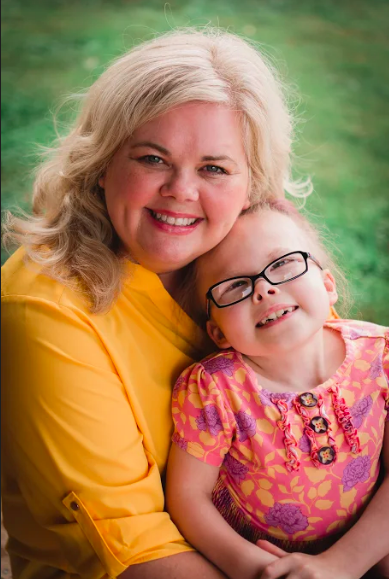
Grace Anna: My name is Grace Anna. I am nine years old, and I have a rare form of dwarfism called Conradi Hunermann Syndrome. It makes my back curl up, and it won’t let me grow all the way, and that’s part of the reason why I’m in a wheelchair. I just had a hip surgery not too long ago.
Angela: My name is Angela Rodgers. I am an author of Grace Anna Sings and our new children’s book, Who Do You See When You Look At Me? I’m a former middle school science teacher, and I’m also an advocate for people with disabilities and for recreational equipment, for people of all abilities to be able to play together and grow. I’m Grace Anna’s and Isaiah’s mom.
“She was perfect to me.”
Angela: When I became pregnant with Grace Anna, in the back of my head, I always worried that something else might happen with her. I didn’t, until the third month, gain a whole lot of hope because with most pregnancies in the first trimester, you try not to get overexcited, because that’s when most miscarriages happen.
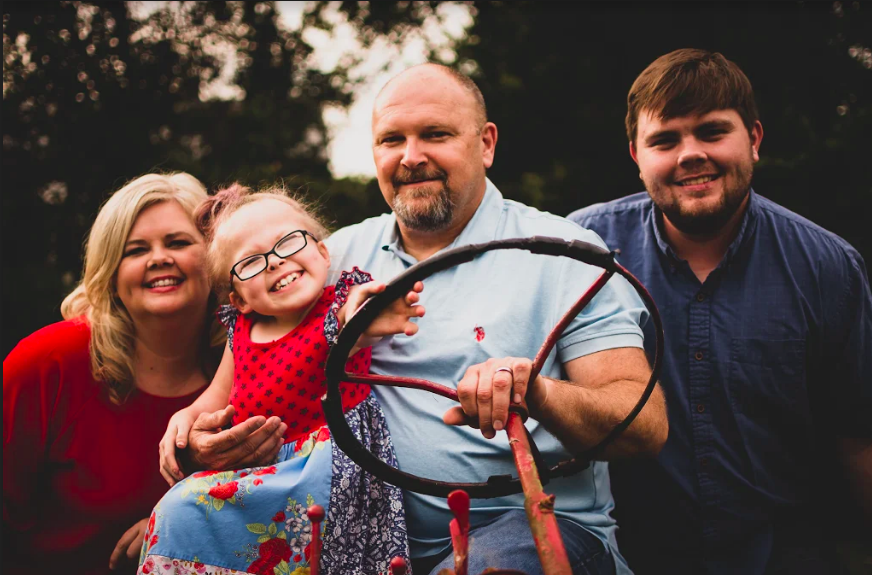
But at the third month into my pregnancy, we went to doctors in Lexington, Kentucky, and they told us that something was wrong. They didn’t know exactly what was wrong. Her thighs were measuring not the correct age for how long I was pregnant, and they thought there was some malformation at her brain stem.
They kind of suggested that I had options about the pregnancy, and we made it very clear to the doctor at the time that our option was to have this baby—that we loved her and it didn’t make any difference to us what they told us. We wanted this little girl, and they told us at that appointment at three months that she was going to be a girl. I thought that was pretty cool. I didn’t expect that.
From the very beginning, we wanted Grace Anna, even when the doctors didn’t give us a whole lot of hope. It was never a thought in our head to terminate the pregnancy.
“From the very beginning, we wanted Grace Anna, even when the doctors didn’t give us a whole lot of hope.” -Angela Rodgers
We wanted Grace Anna from the very beginning, from that very first ultrasound when I saw her little heart beating. You know, I fell in love. Honestly, since she was born, she’s always had this spirit about her. She’s a fighter. She’s full of life, full of love, and anything is possible. She was perfect to me, no matter what they said from the beginning.
Grace Anna Captures Hearts with National Anthem Video
Angela: When Grace Anna’s video of her singing the national anthem went viral, it was kind of crazy at first. We got a phone call from [country music artist] Sammy Kershaw. His manager said they had played it at his concert that night, and then we started getting a lot of emails from people. The vast majority of the first ones were veterans and active military, and that really touched our hearts because we have a lot of veterans in our family. And anything that we can do as a family to lighten the load of our men and women in service, our veterans, is something we absolutely want to be part of.
But what would touch my heart so deeply is you would see these colonels and these generals with all these medals be brought to tears when Grace Anna would sing the national anthem. When we’d travel to Topeka, Kansas to sing for the military veteran project for their gala, Colonel Garcia, who that had worked with President Reagan and President Bush, asked to have a selfie with our daughter. And it just blew my mind that this man that had served our country in many different ways in which I admired was asking to take a selfie with our four-year-old daughter.
“But what would touch my heart so deeply is you would see these colonels and these generals with all these medals be brought to tears when Grace Anna would sing the national anthem.” – Angela Rodgers
She’s always had this gift to touch others through her music and her story, and that video was the beginning of what has been an incredible journey for our family, especially for Grace Anna, to touch the lives of so many people with her story and her voice.
Grace Anna: Singing makes my heart happy. I really like the way people smile when they hear me sing, especially friends and family. I like the way people cheer and jump up and down.
Seeing Others for Who They Really Are
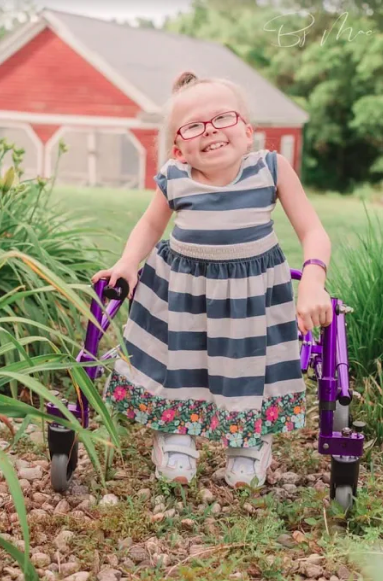
Angela: We had the honor of meeting Bobby Henline at that gala also, and we had talked to Grace Anna about how God makes each one of us different and, you know, sometimes you go through things that change who we become. And we discussed with her how Mr. Henline had been serving our country, and he had gotten burnt and injured serving our country, and that he might look a little different, but he’s still the same person on the inside. And that’s what we should really be concerned about, who somebody is on the inside.
“Sometimes you go through things that change who we become.” – Angela Rodgers
And when she met Bobby, she went right into his arms that evening at the gala and gave him a hug. She really looks at the inside of somebody, and who they are, instead of just looking at somebody’s shell and judging them by what they look like.
Grace Anna: I think God made each of us with unique gifts. We’re all different in some way. So we can show love by being kind and trying to learn from each other. Everybody was made by God, so He wants us to love each other.
“I think God made each of us with unique gifts. We’re all different in some way. So we can show love by being kind and trying to learn from each other.” – Grace Anna Rodgers
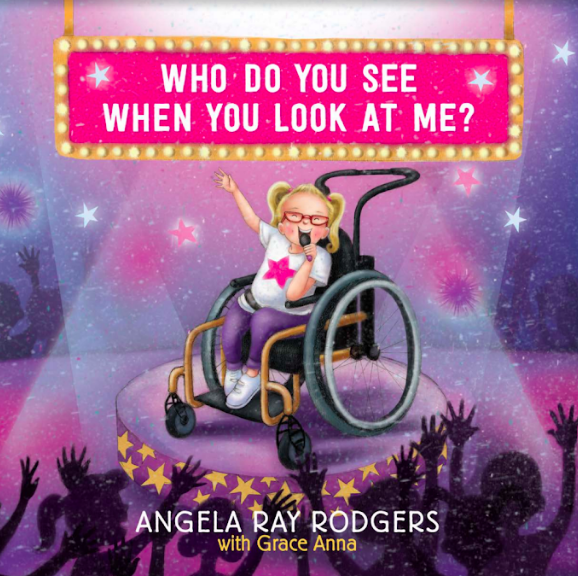
Angela: God has a plan for Grace Anna. He had a plan for her before she was even born. And we quote the scripture to her quite often, that God knew her before He made her in my little belly, before He created her. He knew her. He knew her heart. He knew what she would become. And He had plans for her.
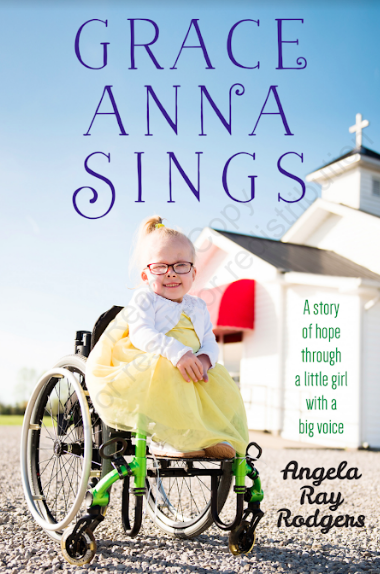
Grace Anna is no different than anybody else. She might be a little bit smaller and she has health issues and she can’t walk just like everybody else, but she can walk some. He can use her for His glory in the way that He wants to use her, and she can have joy and happiness and fulfillment through God in her daily walk in life.
Narrator: To find out more about Grace Anna, her music, and the books Grace Anna Sings and Who Do You See When You Look at Me?, please visit the Grace Anna Sings Facebook page.
Narrator: Next time on the Jesus Calling Podcast, we speak with Contemporary Christian Music artist Austin French. A competitor on ABC’s Rising Star and NBC’s The Voice, Austin’s first album debuted at #2 on the iTunes Christian album chart. But Austin’s journey to finding his voice of worship didn’t come easy. He shares about the early heartbreak he experienced when he was rejected by the very people he thought were supposed to stand by him.
Austin French: My parents got a divorce when I was eight, and it was a really big thing for a small town in Georgia. We were the biggest church in the area. I remember the pastor coming to our house and sitting down with my two sisters and I, and my mom, saying, “Hey, we love you, we’re hurting for you, but please never come back.”
And then I decided at that point that, Well, now my church is embarrassed of me. I must have something wrong with me that the church can’t handle.
So I kind of decided at that moment in my life that I was just done with the church forever. I needed healing. I was hurting. I had an unforgiveness in my heart, scars that I needed someone to heal, to step in. And that night I met Jesus, and everything changed.
Narrator: Do you love hearing these stories of faith weekly from people like you whose lives have been changed by a closer walk with God? Then be sure to subscribe to the Jesus Calling: Stories of Faith Podcast on Apple Podcasts, Stitcher, or wherever you listen to your podcasts. If you like what you’re hearing, leave us a review so that we can reach others with these inspirational stories. And, you can also see these interviews on video as part of our original web series with a new interview premiering every other Sunday on Facebook Live. Find previously broadcasted interviews on our Youtube channel, on IGTV, or on jesuscalling.com/media/video.
